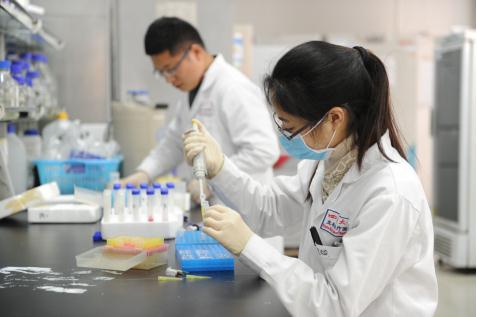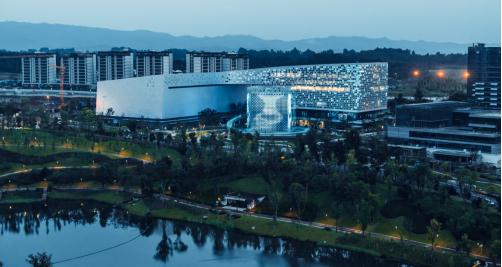City implements cooperation and technological projects to position itself as beacon of development
Chengdu, capital of Sichuan province, is the birthplace of ancient inventions — Shu brocade weaving techniques, the world's earliest paper money Jiaozi and woodblock printing. Today, the city is continuing its pursuit of innovation, as it has seen notable progress in building itself into a hub for scientific and technological innovation.
In the 2022 edition of the World Intellectual Property Organization's Global Innovation Index, among the top 100 science and technology clusters across the world, Chengdu ranked 29th, close to Chicago in the United States, Singapore and Tel Aviv in Israel; a rise of 27 places compared with 2018.
Behind this reputation are Chengdu's efforts to push forward innovation-driven development, improve innovation capability, cultivate multiple innovation players, accelerate the commercialization of scientific and technological innovations and build a national highland of innovative talents, a local official said.
Universities and research institutes are the sources of scientific and technological innovation and important engines of urban development, according to local officials. Considering this, in recent years Chengdu has been teaming up with key universities across the nation, broadening collaboration through signing cooperation agreements and building cooperation platforms with them.
For instance, in March 2016, Tsinghua University established the Tsinghua Sichuan Energy Internet Research Institute in Tianfu New Area in Chengdu. It was the first such cooperation research institute set up in Sichuan, which aims to promote the construction of a clean, low-carbon, safe and efficient energy system, carry out cutting-edge research and incubate energy internet industries.

The Chengdu Science City surrounding Xinglong Lake in Tianfu New Area is home to a slew of high-tech businesses. MA JI/FOR CHINA DAILY
Since its establishment, the institute has undertaken more than 700 scientific research projects at all levels. Over 500 patents have been applied and 200 of them have been authorized.
Performing as an incubator for energy startups, the institute has so far helped 17 enterprises to reach the market. A gazelle enterprise, a term used to describe a young fast-growing company, worth over 1 billion yuan ($138.96 million) is included in the list.
The institute's several energy and power-related innovation results have been applied in more than 20 provinces and cities across the country, according to the institute.
Looking at the bigger picture, the institute is located at Chengdu Science City, an important component of the Western (Chengdu) Science City. Built along Xinglong Lake, the Chengdu Science City has seen a large number of innovation projects jointly launched by the local government and universities mushrooming, a local official said.
In July, a cooperation agreement to build an innovative equipment research institute, which will focus on natural disaster monitoring and prevention, was signed among the administrative committee of Sichuan Tianfu New Area, the Chengdu science and technology bureau and Beijing Institute of Technology.
In August, the Chengdu branch of the Chinese Academy of Sciences moved to its new campus within the science city. According to commercial entities of the branch, a training base for high-caliber professionals, a research base focusing on high-level breakthrough technologies as well as bases for product commercialization and industrialization will be set up in the next few years.

Researchers from Sichuan University conduct an experiment. [Photo provided to China Daily]
Up to now, Chengdu has established strategic cooperative relations with 21 key universities outside the city to build innovation platforms at the Western (Chengdu) Science City, a local official said. It has also been working closely with Chengdu-based universities such as Sichuan University and the University of Electronic Science and Technology of China.
Moreover, Chengdu has carried out a total of 300 matchmaking events between universities and enterprises. It held such events at Tsinghua University, Shanghai Jiao Tong University and the University of Science and Technology of China.
About 1,500 cooperation projects between schools and enterprises, with an investment of over 14 billion yuan, were facilitated thanks to the help from the local government.
To date, a great number of cutting-edge scientific and technological products made in Chengdu have entered a bigger market and buoyed the city's growth.
For example, during the Beijing 2022 Winter Olympics, many green and low-carbon products used in the venues were made in Chengdu. They included cadmium telluride thin film solar cells, smart street lamps and hydrogen fuel cell buses.
According to the local government, a genetic sequencing platform developed by Chengdu-based Qitan Tech has been well received by more than 100 institutions covering the fields such as animal and plant research.

The National Supercomputing Center in Chengdu is the first of its kind in western China. XIAO YAO/FOR CHINA DAILY
Chengdu has also progressed in building major innovation platforms and high-level technological infrastructure. Situated at the core of the Western (Chengdu) Science City, Tianfu Cosmic Ray Research Center in Chengdu is now completed. It will back up the operation of China's Large High Altitude Air Shower Observatory and undertake in-depth related physical research.
Tianfu Yongxing Laboratory, with an aim to promote the country's leading carbon neutral technologies and industries, has recruited the first batch of scientific research professionals.
Another telling example of Chengdu's innovation capability is China's National Supercomputing Center in Chengdu. It is the first of its kind in western China.
According to local officials, during the 14th Five-Year Plan (2021-25), Chengdu plans to enhance its capabilities in innovation, commercialization of innovation results and urban governance. It strives to leverage its sources, talents and system to strengthen its innovation.
"We are speeding up our efforts to build Chengdu into an important innovation source in China and an innovative city with international influence as well as unleashing the potential for the nation's innovation-driven high-quality development," a local official added.
(APD)
 简体中文
简体中文












